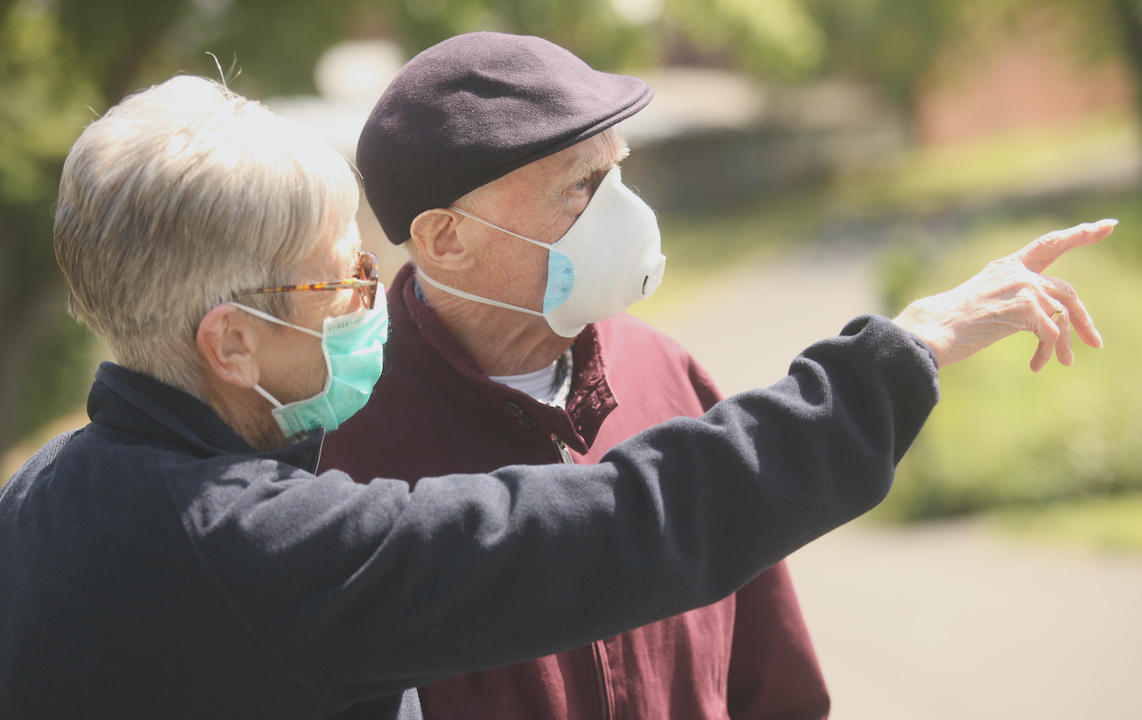Almost every mis-step made by the Health Department and the Stormont Executive in dealing with the Covid-19 pandemic was a direct result of following the lead of Boris Johnson and his advisors in No. 10 Downing Street.
One of the heroes of the pandemic, Dr Gabriel Scally, the Belfast-born-and-bred President of the Epidemiology and Public Health section of the Royal Society of Medicine and former Regional Director of Public Health in England, as late as this week confessed himself baffled as to why Scotland, Wales and N Ireland blindly followed Boris’ lead.
UK Government still intent on destroying its credibility on #COVID19. I don’t understand why #Scotland #Wales and N Ireland follow blindly. UK scientists condemn 'Stalinist' attempt to censor Covid-19 advice. https://t.co/t4hFn0glZj
— Gabriel Scally (@GabrielScally) May 9, 2020
That is until with the publication on Tuesday of the Executive’s own plan to emerge from lockdown, which quotes WHO advice extensively in its detail, and commits to community tracing, the politicians on the Hill broke with Number 10’s increasingly erratic, bumbling and deadly leadership in the battle against the coronavirus.
Some of these costly mistakes have been highlighted by nationalist representatives since the Covid storm hit in earnest in mid-March.
Latterly, however, there has been a belief among the nationalist parties that only a united Executive can properly tackle the crisis — as a consequence, criticism of Department of Health policies and strategies, inspired by the London approach, which have left the public exposed to the ravages of the coronavirus, has been toned down.
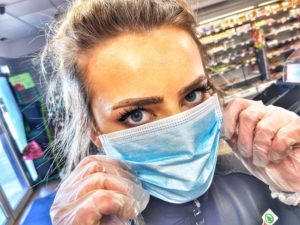
MIXED MESSAGES: Advice on make was influenced by supply not science
But none of these political machinations can alter the fact that on every occasion when the local authorities stray from the advice of the World Health Organisation — the only global body with the proven ability and expertise to tackle a pandemic — lives were lost.
A look over the timeline to the crisis since February shows that time and resources were invested in an English DIY approach guided more by politics than science. The most embarrassing moment for those locally whose strings were being pulled by Boris – even as they claimed they were following the science — came last week when the scientists admitted they told the public they shouldn’t wear face masks not because that’s what the scientific evidence dictates but because they were fast running out of supplies for hospitals and care homes.
Nowhere is the slavish aping of London’s failed approach more evident than in Britain’s belated decision to require anyone arriving at a British airport to self-quarantine for 14 days.
This policy kicks in this week.
It has been policy in the South of Ireland since mid-March.
Astonishingly, however, there is still no request of those arriving into the City Airport from London — a global hotspot for Covid-19 — to take any action whatsoever to protect others by self-isolating.
Arlene Foster says any restrictions on travellers from Britain into Belfast would be unnecessary as “we were part of the same country”. A clear case of putting politics before science and a position not deemed appropriate for cattle — the entire island was locked down during the foot and mouth outbreak of 2001 — but apparently appropriate for humans in 2020.
LESSONS OF PANDEDMIC EXERCISE IGNORED
The Health authorities had carried out emergency testing here for a pandemic. This was modelled on the Exercise Cygnus, a national pandemic flu exercise in October 2016, which concluded that care homes could suffer most from a virus. There is no evidence that its recommendations were taken on board by health chiefs here who appeared to have been caught totally off guard by the coronavirus and seemed to be more geared up for a flu pandemic.
Among the findings of Exercise Cygnus were that PPE would be in short supply if a crisis hit. No steps were taken to build up supplies — NHS England took a similarly lazy and disastrous approach which is why PPE was unavailable in hospitals and care homes when the proverbial hit the fan.
INTERNATIONAL ALARM CALLS IGNORED
[caption id="attachment_38236" align="alignleft" width="300"]

In February, when the World Health Organisation declared a public health emergency of international concern, Public Health England declared the disease posed a “moderate” risk to public health. The Public Health Agency and Department of Health here, taking its lead from England, relaxed its guard.
Officials here blindly followed the approach of Boris Johnson, as announced on 26 February, of allowing the virus to spread until ‘herd immunity’ would protect the community.
One health professional who moved in early March to install screens in his place of work was asked by a senior official in the Health Department if he was “not going over the top a little”.
WHERE IS THE PPP?
It became clear almost immediately that following the lead from England had left our frontline workers bereft of proper PPE. Statements to this paper and others from workers that they were being left dreadfully exposed by the lack of PPE were dismissed by health department bosses. Those on the ground were accused of scaremongering or not understanding that the flimsy scrubs and cloth face masks were sufficient to treat Covid-19 patients, even as the lesson from Europe was that the current approach was imperilling doctors and nurses.
Efforts by the Sinn Féin Finance Minister Conor Murphy to go past the PPE deniers in the Department of Health and source alternative supplies in China, in consort with the Irish Government, came to nought as the US entered the global supply market.
INDIVIDUALS STEP UP
So desperate were frontline workers as the first waves of the Covid-19 virus rolled in, that Belfast businessman Danny Moore was moved to set up his own fundraising operation to provide PPE and supplies to the hospital workers. The goal was to raise £20,000. At the time of writing, the total stands at just over £150,000.
That initiative was to be mirrored by an outpouring of community activity designed to help the most vulnerable through the crisis. There were tremendous acts of self-sacrific and heroism by health workers, not least when staff at Brooklands care home moved into the institution to best protect residents and their own families from the ravages of the coronavirus.
Our 70 day timeline is the story of how health bosses, taking their orders a British Government which would go on to have the most ineffective response to Covid-19 in Europe, fiddled while the coronavirus blazed through our care homes.
March 2: Boris Johnson says UK is “very, very well prepared” for the pandemic. The following day, he shakes hands with everyone he meets at a hospital treating Covid-19 victims. He goes on to attend a Six Nations game on March 7 and allows Cheltenham to go ahead. The Irish Government cancels all sporting events.
March 9: St Gall’s GAC closed its clubhouse for a deep clean after a patron tests positive for Covid-19 — by the end of that week, 18 people had tested positive for the virus. This was the first time the reality of the disease struck home for many in West Belfast.
March 10: Chief Medical Officer Michael McBride says there’s no need to cancel forthcoming sporting fixtures such as the schools rugby final on St Patrick’s Day. He suggests that if fans can’t go to games, they will watch the event in a pub which could be more dangerous. As the GAA pulled the plug on all fixtures and the organisers of St Patrick’s Day parades across the country decided to cancel, Dr McBride said, “"I'm not being critical of people who have cancelled events, but I am following the science.” He added: "There are only limited benefits to cancellations. We also have to weigh up the social and economic gains and losses."
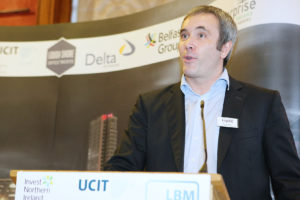
ACTION:As the Health Department dithered, Danny Moore stepped up
March 12: Boris Johnson abandons attempts at testing in the community. 1,500 tests per day had been carried out up to this point. The Health Department here shortly follows suit.
Johnson allows major sporting events to take place, schools to stay open and people to go to work. His advice for over-70s, who would go on to fare worst in face of the pandemic: avoid cruises. On the same day, the Republic of Ireland entered lockdown — without consulting the Stormont Executive.
12/13 March: The Executive met on the Thursday and agreed to delay school closures — in line with the approach of Boris Johnson’s government — only for Sinn Féin to reverse course the following day and demand immediate shutdown of all educational institutions. The Chief Medical Officer in the North, Dr Michael McBride continued to advise against school closures – though in the South, the government had already instigated a closure of all schools.
March 15: UK Chief Scientific Advisor Patrick Vallence says 60 per cent of the population will contract Covid-19. He notes that the vulnerable and elderly in care homes will need special support. He says herd immunity will be built up when “60 per cent of us” get the virus. “For most people, it is a mild disease.”
March16: 10 special-ed schools closed their doors as the Executive prepared to meet re calls for school closures. The total number of confirmed cases in the North was just 45 but already pubs, clubs and sporting venues had entered lockdown — many before official advice to do so. Boris Johnson suggests people should not visit pubs but says they will remain open.
Tedros Adhanom, head of World Health Organisation, said that the UK was trying “to fight a fire blindfolded” by refusing to test. “We cannot stop this pandemic if we don’t know who is infected”.
17 March: A St Patrick’s Day like no other as all pubs in Belfast close, festivals, parades and the SPAR Craic 10k are cancelled. There are 52 confirmed cases of Cororavirus in the North, 223 in the South, where two people have died.
The UK Government’s top scientific advisor Patrick Vallance says keeping deaths below 20,000 would be “a good outcome”. Unionists continue to refer to being guided by the science – to be precise by Sir Patrick Vallence.
Imperial College London issued a new report which showed that government strategy of trying to contain, rather than supress, the disease would result in up to 250,000 deaths, overwhelming of the NHS. This immediately leads to the ditching of the ‘herd immunity’ strategy by the British PM.
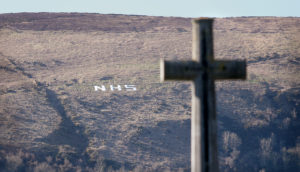
GRIM MILESTONE: First death from Covid-19 is recorded
March 18: Arlene Foster announces that schools will close after the weekend from Monday 23 March. – the same approach as in England. Many schools have already decided not to reopen after the St Patrick’s break. A legal challenge against DUP Education Minster Peter Weir to force him to close schools is stalled.
March 19: First death from the coronavirus in the North. Minister Swann says Executive parties are united in their approach.
March 20: The Department of Health, taking its lead from England, abandons the WHO approach of test, contact trace, isolate. Sinn Féin MLA Pat Sheehan brands the decision “disastrous”. Why are the health authorities here not following the advice of the World Health Organisation who insist the only way to tackle the Coronavirus is to ‘test, test, test’?” he asks. Eminent epidemiologist Professor Gabriel Scally dismissed claims by Health Minister Robin Swann that the North was doing better than the South in tackling Covid-19 because it had fewer cases confirmed. There was more testing taking place in the South.
With local health bosses depending on the British Government for emergency supplies, Downing Street says the PPE shortage crisis is “completely resolved”. Millions of items of PPE continued to be shipped overseas from Britain by British companies.
British pubs, restaurants and cinemas are finally closed on the order of Boris Johnson, five-six days after shutdown in the North.
Arlene Foster advises the public that the best way to battle the coronavirus was to “embrace the spirit of Northern Ireland”.
March 21: As it became clear the Health Department didn’t have enough test kits, Randox, which received over £20m in government funding in 2016, continued to export thousands of kits to NHS England.
Pat Cullen, head of the Royal College of Nursing in NI, warned that unless there was widespread coronavirus testing of all key health workers, there would not be a functioning health service.
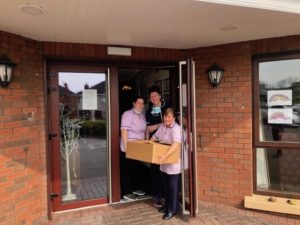
PPE PLEAS: The Andersonstown News procured and provided PPE visors free to care homes bereft of supplies
March 23: England enters lockdown as Boris Johnson introduces a suite of restrictions including banning more than two people being together outdoors unless they are from the same household.
In a broadside against unionists blindly following the lead of the British Government, Sinn Féin junior minister Declan Kearney says, “Those who have been too slow to act for their own political reasons, or in Britain, who may have chosen to allow a Brexit agenda to influence the tempo of that government’s approach need to wise up.” He calls for more community testing and more PPE for frontline workers.
March 24: Agriculture Minister Edwin Poots closes forest parks just days after announcing they would be kept open during crisis.
March 25: First care home resident here dies of Covid-19.
March 27; Taoiseach Leo Varadkar extends and tightens lockdown in Republic of Ireland. Citizens are not allowed to go further than 2km from their home.
March 28: New powers to enforce guidelines on people staying at home and businesses staying closed come into force in the North.
March 29: As health workers continue to protest shortages of PPE, the Chinese ship a gift of 10,000 items to Belfast Mayor Danny Baker.
31 March: Dr Gabriel Scally, renowned epidemiologist, appeals to the Executive to decouple itself from British policy on Covid-19 pandemic. His plea falls on deaf ears at the Department of Health.
I wrote: "It is a big ask, but now is not the time to be captives of our histories. Lives can and should be saved. The political leaders in the North need, on this specific issue of coronavirus, to decouple themselves from the Whitehall approach." https://t.co/63teISSiq3
— Gabriel Scally (@GabrielScally) March 31, 2020
Scally says Ireland’s geographical advantage as an island is being squandered by Health Department’s refusal to adopt all-island approach.
Business leader Danny Moore brands failure to test frontline staff in hospitals for Covid as “a scandal” and appeals to Randox to release testing kits for local use. A full six weeks before the British Government conceded the need for visitors arriving at airports to self-isolate for 14 days, he calls for “Hard lock down of non-essential travel through our airports and high quality screening in place on entry”. No politician picks up his call.
2 April: Two weeks after the WHO head said the failure to test was like fighting a fire blindfolded, the British Government publishes a testing plan. By the end of the month, they would be doing 100,000 tests a day, says Health Secretary Matt Hancock. There is still no clear testing plan in the North.
Another Belfast business leader, Pete Boyle of Argento, funds a start-up to produce visors for frontline stuff who continue to cry out for supplies. “When I contacted the health service to offer assistance, I was getting mixed messages. At the top, they were saying we have plenty of everything but in the frontline, the nurses and doctors were crying out for PPE.”
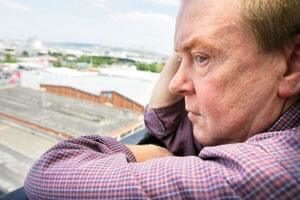
FATALITY: Former blanket man John Thomas (JT) passed away from Covid-19
Royal College of Nurses director Pat Cullen reveals that at a meeting the previous day with the First and deputy First ministers, she could not get an assurance that her members would be supplied with sufficient PPE. She writes to Robin Swann seeking clarity on the situation amidst continuing complaints from frontline staff but is told there is “no quick fix”.
April 3: Sinn Féin Finance Minister Conor Murphy reveals that a proposed joint order with Irish Government for PPE from China was never placed when the US government and states entered the market and sent prices rocketing and supply plummeting.
Randox makes deal with local health department to hold back some kits which are being shipped to NHS England for local supply chain.
Deputy First Minister Michelle O’Neill says response of Robin Swann is too slow to ramp up testing and issue PPE and accused the UUP man of "slavishly following the Boris Johnson model".
Minister Swann insists he has enough PPE to cover expected surge between 6-20 April. Care homes and frontline hospital workers continue to report shortages.
April 4: A Covid test centre for health workers opens at SSE Arena car park.
April 6: Boris Johnson hospitalised and suffering from Covid-19 is moved to intensive care.
Belfast clinical epidemiologist Dr Michael Donnelly, who would emerge as a fierce critic of the Health Department handling of the crisis, reveals that there are no ECMO machines in the North which can provide vital support to patients who are dying due to respiratory problems. He ridicules a department claim that critically-ill patients with Covid-19 would be flown to Newcastle, England, for treatment. The policy is later shelved in favour of an agreement with Irish authorities to use an ECMO machine in Dublin.
April 7: A Memorandum of Understanding is signed between the Departments of Health north and south. As it emerges, a person with Covid symptoms in Lifford has to self-isolate for 14 days while a person in Strabane with symptoms must self-isolate for just seven days. While welcomed as “an excellent framework”, there is little evidence of any practical impact from the memorandum on strategies north and south over the following month. The blame for that doesn’t just lie north of the border, as the Irish Government focus is on the 26 Counties only.
As Health Department remains silent on escalating impact of Covid-19 on care homes, the Andersonstown News reveals that staff are fearful to go to work and appealing for a proper testing regime. This would be introduced three weeks later.
April 10: PPE visors bought by the community are distributed free to care homes in West Belfast who continue to protest a lack of equipment despite promises of help from the Department of Health.
April 12: Easter Sunday: There have now been over 100 deaths from Covid-19.
British reveal half of all Covid-19 deaths are occurring in care homes. Testing regime in local care homes remains shambolic amidst claims by relatives that hospitals are sending elderly back to residential settings even though they tested positive for Covid-19. Gaps remain in provision of PPE by authorities to domiciliary care workers.
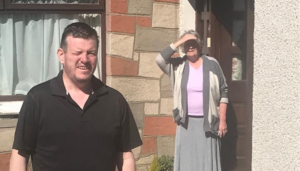
RELEASED: Niall Murphy was released from hospital on April 30 after spending a month in hospital, half of that time in an induced coma.
Robin Swann announces that he has asked the British Army to help build an emergency field hospital at Long Kesh and with logistics. The hauliers association ask why their furloughed members can’t assist with supplies. In the event, the British Army is, apparently, not deployed.
The British Health Secretary unveils a contact tracing app — which isn’t heard about again until the end of the month when it is rolled out…and fails to work.
April 13: Outbreaks of the disease in care homes have steadily increased throughout the month as managers and staff appeal for more help. Health Minister Robin Swann reveals 32 care homes have now experienced outbreaks.
April 15: Care home staff with Covid symptoms still aren’t being tested regularly – as they self-isolate they reduce staffing levels at the homes. Meanwhile, the RQIA, which has responsibility for nursing homes, says staff can now test residents with symptoms.
April 16: The CEO of the Public Health Agency tells Stormont’s Health Committee 400 staff have been recruited to carry out contact tracing and are being trainded.
Dr Michael Donnelly declares the coronavirus crisis “the Grenfel Tower of public health.”
April 17: There is shock as NISRA reveals the figure for Covid-19 deaths is much higher than previously thought, releasing new, more accurate figures which were a third higher than previous Public Health Agency figures.
April 19: The Department of Health launches a web-based statistics dashboard to give daily updates on battle against Covid-19. It is taken down two days later and hadn’t reappeared by end of the month.
May Day, May Day! What’s all the fuss about? Thread. /1
— Mike Tomlinson (@MikeTQUB) May 1, 2020
Health Minister Robin Swann defends decision to ship 250,000 items of PPE to England from local suppliers. "The 250,000 gowns sent to England over the last two weeks will be immediately reimbursed once their own stocks arrive,” he says.
The British Government admits PPE supplies are running low and not always reaching frontlines as they advise healthcare workers — despite the deaths of some of their colleagues — to reuse face masks and gowns. More stocks were coming from Turkey, says Number 10. When they finally arrive, much is unusable. The local Health Department voices confidence in its supply chain arrangement with their English counterparts.
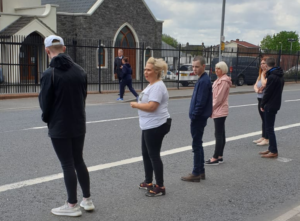
RESPECT: Staff from Brooklands and local youth volunteers applaud the funeral cortege of resident Isabell Moreland (see video below)
April 20: Department of Health revises estimates of deaths from the virus in first wave to 1,500 (from a prediction of 3,000 on 1 April) as SDLP leader Colum Eastwood calls for an all-island mass testing and tracing regime.”This iscritical to identifying coronavirus outbreaks, isolating vulnerable communities and preventing further transmission," he said.
April 21: Sinn Féin’s Declan Kearney takes another swipe at his unionist partners in government. “Disturbingly the extension of lockdown in the short term masks an argument which is being encouraged by some right-wing elements in the British Cabinet, and also by some Unionists in the north of Ireland, that the lockdown measures should be relaxed, and that economic activity and productivity should be resumed. Corporate greed over public welfare.” His fellow-Executive Minister Diane Dodds describes the comments as “unfortunate”.
As the DUP and Sinn Féin differ on the opening of cemeteries — Sinn Féin shortly backtrack their opposition — officials say the peak of the virus has now passed.
Lifting the Lockdown? @WHO says a criteria for easing restrictions should be the capacity, "to detect, test, isolate and treat every case and trace every contact". Look at the disparity in testing facilities between UK and Ireland. #coronavirus #COVID19 pic.twitter.com/jMvqpeJZy7
— Gabriel Scally (@GabrielScally) April 21, 2020
April 22: Covid deaths stand at 250. There are 300 confirmed cases of coronavirus in care homes.
April 23: Chief Medical Officer Dr Michael McBride says testing is not the solution. "We will not test this virus into submission,” he says. “This virus is not going away.” Community testing has still not started.
Arlene Foster says that to move to a recovery stage "we need to test, we need to trace and we need to track where the disease is in the community.” Revealing a “pilot programme” would be rolled out the following week, she says moving to a surveillance phase means knowing "what the virus is doing".
The Andersonstown News editorial comments: “Two weeks on from our first whistle-blower stories about the lack of testing in care homes, there is still no firm process in place.”
April 24: The Guardian newspaper reveals that meetings of the ‘independent’ UK Govt SAGE (Scientific Advisory Group for Emergencies) Committee which was providing ‘the science’ guiding the British Government (and the DUP and UUP) were attended by Number 10 spin-doctor Dominic Cummings.
New figures show that the number of coronavirus-related deaths in the North is significantly higher than previously reported.
The Northern Ireland Statistics and Research Agency (Nisra) weekly breakdown shows the total number of deaths by 17 April (276) was higher than had been reported by NI's Public Health Agency by the same date (212). About a third of the 276 deaths (96) occurred in care homes and hospices. Separately, there is controversy around claims that the health department demanded to see the figures before release — which results in a slap on the wrist for the department from the UK Statistics Authority.
Ap;ril 23: The Health Committee at Stormont is told that instead of a legion of contact tracers, GPS would be asked to act as ‘spotters’ for the disease.
April 27: Additional funding announced by Minister Swann to support care homes — by 12 May none of it had reached its intended recipients. Health Committee member Pat Sheehan of Sinn Féin says approach to care homes has been “disastrous”. “Care homes were effectively ignored,” he said. “Only now is the department getting its act together.”
April 28: Irish Times reports a spike in coronavirus case along the border, especially in Monaghan and Cavan.
Chief Medical Officer Dr Michael McBride says testing “is significantly ramped up”.
The Public Health Agency says 69 care homes have now experienced Covid-19 outbreaks.
April 29: Minister Swann commits to transparency on statistics as NISRA and PHA death toll figures continue to show a huge disparity.
DUP Minister Edwin Poots calls for churches and garden centres to be allowed to open.
Dr Gabriel Scally advises the public not to be fooled by Department of Health claims around testing.” If they did finding/testing/tracing properly they wouldn't need surveillance, plus they'd halt spread’” he says.
Don't be fooled. Case finding, testing, contact tracing, isolation is NOT being re-introduced in UK. Northern Ireland @healthdpt will be doing random testing for surveillance. If they did finding/testing/tracing properly they wouldn't need surveillance, plus they'd halt spread. pic.twitter.com/GxxRcU6bgU
— Gabriel Scally (@GabrielScally) April 29, 2020
April 30: The British Government hits its 100,000 tests-a-day target by counting tens of thousands of test kits which had been put in the post.
May 1: NISRA figures show almost 60 per cent of all Covid deaths are taking place in care homes.
QUB Professor Emeritus Mike Tomlinson is accused of fake news for stating that laxer Covid restrictions in the North would lead to more deaths, proportionately, than in the South. He sticks to his guns: “I think this is the outcome of two different public health policies, particularly around testing, tracing and isolation. And I firmly believe we could be saving more lives with a common approach and a high level of cooperation north and south. To even consider the easing of lockdown measures without seeing the island of Ireland as a whole makes little sense.”
Sinn Féin leader Mary Lou McDonald says "widespread community testing and efficient tracing" is needed in the fight against Covid-19.
Leo Varadkar extends the lockdown in the Repubilc of Ireland by another two weeks – again without consulting his colleagues “overseas” in Stormont.
@niahealth Chair @GildernewColm on today’s discussion with @BSO_NI on procurement and PPE issues during the pandemic and with @healthdpt officials on budget matters pic.twitter.com/IIcR91t4t0
— niahealth (@niahealth) April 30, 2020
May 1: Colm Gildernew MLA, Chair of Health Committee, rebuts a suggestion by health department officials, in evidence to the committee, that the pandemic was “unforeseeable”. “It was unforeseen not unforeseeable,” he states.
May 3: Over half doctors in the North who are surveyed say they have bought their own PPE or accepted donations.
May 4: British Health Secretary Matt Hancock announces the roll-out of a Covid-19 app on the Isle of Wight and says, if successful, app will be rolled out across the UK. The app is withdrawn just days later.
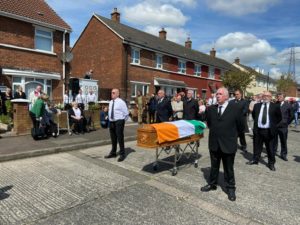
LAID TO REST: Jim Scullionwho led IRA prisoners in the cages of Long Kesh in seventies passes away from Covid-19 and is buried from his Turf Lodge home
May 5: It is confirmed that 14 residents in Glenabbey Manor care home in Glengormley have now died from Covid-19. UK is has more deaths linked to the virus than any other European country; within days the figure, which doesn’t reveal the full extent of care home deaths, will top 30,000.
UK Chief Scientific Advisor Sir Patrick Vallence now tells Commons Committee mass testing for Covid-19 earlier would have lessened impact of pandemic. “I think if we'd managed to ramp testing capacity quicker it would have been beneficial.”
May 8: NISRA stats show that from March 28 to 1 May, there were 703 deaths more than the yearly average. In the same period, the Public Health Agency/Department of Health reported just 404 deaths. 300+ deaths unaccounted for.
Olive MacLeod, CEO of Public Health Agency tells Health Committee she “misspoke” when on April 16 she said 500 contact tracers had been recruited and were being trained. “I spoke out of turn. That’s incorrect.”
Up until 1 May, NISRA figures show the North had 516 deaths linked to Covid-19. Of those deaths, 232 (45%) have been in care homes. Deputy First Minister Michelle O'Neill calls for testing of residents and staff at all of Northern Ireland's 484 care homes
May 9: Boris Johnson announces plans to have travellers into UK airports quarantine for 14 days. The move comes six weeks after it was first requested by health experts but will not apply to travellers coming into Belfast from British hotspots for the coronavirus. Dr Gabriel Scally called for tight controls at Irish airports and ports, co-ordinated across the country, on April 18.
May 10: Boris Johnson announces easing of restrictions and unveils new slogan, ‘Stay Alert’, Control the Virus’ which Welsh and Scottish executives say is incomprehensible.
May 12: Health care operators say they were forgotten about when the crisis started – the Health Department says care homes were part of planning from the start but makes no comment on the lack of follow-through.
Executive unveil five-step move out of lockdown without setting any date to start process or move between phases. Progress will be determined by the number of people being infected by anyone who contracts the virus falling below one. The only way in which such a system can work is by returning to the WHO strategy of February 2020: “test, test, test”, say experts. There is minimal community testing going on at the time of going to press.
Richard Horton, editor of the Medical Journal The Lancet blasts efforts by Boris Johnson and co to shift the blame for their fatal mismanagement of the Coronavirus threat, pointing out that a PHEIC (Public Health Emergency of International Concern) was issued by the World Health Organisation on January 30.
“Finally, you saw our Prime Minister preparing his defence for the public inquiry: “We didn’t fully understand its effects.” I’m afraid that argument won’t succeed. A PHEIC was called on January 30. And then you dropped the ball Prime Minister. That was criminal. And you know it.”
Finally, you saw our Prime Minister preparing his defence for the public inquiry: “We didn’t fully understand its effects.” I’m afraid that argument won’t succeed. A PHEIC was called on January 30. And then you dropped the ball Prime Minister. That was criminal. And you know it.
— richard horton (@richardhorton1) May 10, 2020
In a joint statement, the Commissioner for Older People and the Commissioner for Human Rights here say advice provided to the Government to protect care home residents "was not actioned to the extent it should have been". Eddie Lynch and Les Allamby said officials "should have created a ring of steel to protect care homes" and added that "even now, the Government could do more".
May 13: Health Minister Robin Swann introduces yet another package of support measures for care homes including "significant expansion of testing for care home residents and staff". He adds that the expansion will be informed by advice being prepared for (UK) Government and the NHS by SAGE (the Scientific Advisory Group for Emergencies) and the Department’s Strategic Intelligence group (SIG). The UK is believed to have the highest number of care home deaths in Europe.
As revealed by The Guardian, Number 10 spin-doctor Dominic Cummings sits on SAGE. In belfastmedia.com on 7 April, we reported the desperate appeal of one West Belfast care home manager for urgent assistance: “My plea would be for the government and the community to treat care homes with the same respect and resources as is now given to hospitals. We are facing into the unknown. There is hardly a care home or nursing home left in Belfast which doesn’t have coronavirus among its residents and very difficult and heart wrenching decisions are now being made on a daily basis.”
In the British House of Commons, Boris Johnson denies that official guidelines from SAGE, as recently as March 12, were that ‘it remains very unlikely that people receiving care in a care home will become infected” — which is a matter of fact — and cannot explain reason for an additional 10,000 deaths in care homes in British care homes (above the 8,000 deaths ascribed to Covid-19) in April.
May 18: Health Minister Robin Swann says testing would be extended to all residents of care homes from June, with a rolling staff testing programme also put in place. There have been 137 confirmed or suspected Covid-19 outbreaks in care homes across Northern Ireland, according to figures from the Department of Health. Minister Swann said: "It has to be emphasised once again that testing is not a solution to the Covid-19 threat in care homes. It builds on the wider programme of support that has already been put in place."
Commentator Eamonn Mallie issued a list of questions about care homes fort the Minister and asked if he would apologise for the number of deaths — now reaching 50 per cent of the total – which occurred in residential institutions.
“Order! Order! - Questions to the Health Minister Mr Robin Swann, Order! Order!” pic.twitter.com/Mu0qdVmupO
— Eamonn Mallie (@EamonnMallie) May 17, 2020
May 22: Moves begins to relocate residents from Clifton Nursing Home in North Belfast concerns about its handling of a Covid-19 outbreak.
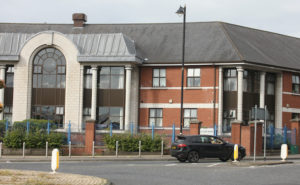
RESIDENTS BEING RELOCATED: Clifton Nursing Home
Health Minister Robin Swann said the relocation was being handled in consultation with residents and their families and said concerns about the home relate in part to its management of a Covid-19 outbreak.
The RQIA has had ongoing concerns for some time about the home, which is operated by Runwood Homes.
Our columnist, the clinical epidemiologist Dr Michael Donnelly analysed the cost being paid by care home residents due to bad decisions by health bosses here.
May: An Independent SAGE group of experts is formed in Britain to provide alternative advice to the UK government. Its membership includes Professor Gabriel Scally and Professor Martin McKeen, both graduates of Queen's.
An unprecedented intervention by Association of Directors of Public Health - calling on UK government to delay easing lockdown until tracing system is robust. How on earth has it come to this? https://t.co/iyX8MweBdC
— Martin McKee (@martinmckee) May 31, 2020
May 23: A two-week quarantine period for anyone arriving in the UK will be enforced from 8 June to prevent "a second wave", the British Government says.This quarantine does not apply to travellers from Britain arriving into airports or ports in the North. The London Government says its restrictions will not apply to travellers from the Republic of Ireland. However, similar legislation in the South from May 15 does not except travellers from Britain from its impact. "We will treat British citizens the same as Irish citizens," said a spokesperson. " There will not be any discrimination if you like, against British citizens. There will an exception for people transiting to and from Northern Ireland. A lot of people transit to Northern Ireland through Dublin and they will be allowed to continue to transit." The Stormont Health Committee will later hear that there are no arrangements for sharing information about arrivals between the jurisdictions.
What are the new quarantine rules?
Passengers arriving in the UK by plane, ferry or train - including UK nationals - will have to provide an address where they will remain for 14 days. There is a £100 penalty for anyone found to have not filled in this ''contact locator'' form.
May 25: No deaths from Covid-19 reported in the South of Ireland where the total number of Covid-19 related deaths is 1,606. Media coverage is dominated by Dominic Cummings, chief spin-doctor, to Boris Johnson who broke the lockdown restrictions but managed to maintain support of PM and his cabinet. The DUP cautions against trail by media. "Trial by media is unseemly in every circumstance but all the more so when a family home and elderly parents are involved."
May 26: For the first time since March 18, no deaths were recorded by the Department of Health as a result of Covid-19 which says its death toll stands at 514 - several hundred short of the NISRA death toll (which stood at 716 up to May 22).
For the first time since 18th of March no one has died in the last 24 hours of COVID19 in the North
— Michelle O’Neill (@moneillsf) May 26, 2020
This is because of the sacrifices that you have made
We are not yet out of the woods, we have seen this today with 9 COVID19 deaths in the South
Please keep following guidelines pic.twitter.com/geM85yaih1
May 27: As lockdown restrictions ease, National Trust car parks here are opened again.
May 28: The R number in the South of Ireland is estimated to be 0.5. The R number is the number of people that one infected person will pass the virus on to, on average. As long as it remains under 1, the virus is in decline. With the R number just below 1, First Minister Arlene Foster reveals plans by the Executive for further lifting of the lockdown restrictions from June 8 to allow outdoors weddings with 10 people present. Large retailers such as car showrooms and shops in retail parks will also be allowed to reopen, she said, pending a final decision at the June 4 Executive meeting.
May 29: New NISRA figures reveal over half (53 per cent) of all deaths in the North occurred in care homes.
Belfast International Airport announces plans to lay off 45 staff and says it is in "survival mode". Plans to taper the British Government's furlough scheme are announced. From August employers will have to pay pension and national insurance for furloughed staff sparking warnings from the hospitality trade of catastrophic job losses if bars and restaurants aren't allowed to open for business before then. From September, employers will also have to contribute to the wages of furloughed employees who will be allowed to work part-time. The Hatfield Bar resumes deliveries of pints after an agreement is reached with the PSNI.
May 31: The number of deaths attributed to the coronavirus in the South of Ireland stands at 1,652. There have been around 25,000 reported cases with almost 8,000 of those involving healthcare workers. The official figure for Britain stands at over 38,489 but the actual figure is believed to be twice that number.
June 1: The Public Health Agency unveils its new contact tracing operation under the aegis of the Public Health Agency and says testing will now be available to everyone with symptoms who requests a test.
